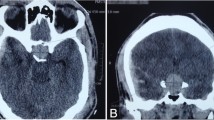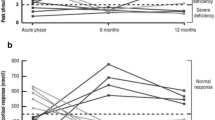Abstract
We describe four young patients (age 19–34 years) with hypopituitarism following closed head injury. The diagnosis was made by demonstration of low basal pituitary hormone levels and dynamic tests showing low pituitary reserve. The time interval between the injury and diagnosis of hypopituitarism was between three weeks and two months demonstrating the difficulty and complexity of making this diagnosis. Three of our patients (all patients suffering from anterior pituitary hormone deficiency) had ACTH deficiency, a condition which may be life threatening if left undiagnosed; these patients also demonstrated central hypothyroidism. Hypogonadotrophic hypogonadism occurred in three of the patients and was treated with hormonal replacement. Diabetes insipidus was the only insult in one of our patients, accompanied other hormonal deficits in two, and did not appear at all in another patient. Information about skull damage was available for three of the patients, and included skull base and facial bone fractures, probably reflecting the extent of injury necessary to cause hypopituitarism. All patients regained normal lives with adequate hormonal replacement therapy.
Similar content being viewed by others
References
Benvenga S, Campenni A, Ruggeri RM, Trimarchi F. Hypopituitarism secondary to head trauma. J Clin Endocrinol Metab 2000; 85: 1353–1361.
Crompton MR. Hypothalamic lesions following closed head injury. Brain 1971; 94: 165–172.
Kaufman HH, Timberlake G, Voelker J, Pait TG. Medical complications of head injury. Med Clin North Am 1993;77:43–60.
Edwards OM, Clark JD. Post-traumatic hypopituitarism. Six cases and a review of the literature. Medicine 1986;65:281–290.
Barreca T, Perria C, Sannia A, Magnani G, Rolandi E. Evaluation of anterior pituitary function in patients with post-traumatic diabetes insipidus. J Clin Endocrinol Metab 1980;51:1279–1282.
Benvenga S, Lo Giudice F, Campenni A, Longo M, Trimarchi F. Post-traumatic selective hypogonadotrophic hypogonadism. J Endocrinol Invest 1997;20:675–680.
Clark JD, Raggatt PR, Edwards OM. Abnormalities of hypothalamo-pituitary-gonadal axis after head injury. Clin Endocrinol (Oxf) 1992;36:481–485.
Scob JE, Havard CW. Anosmia and isolated ACTH deficiency following a road traffic accident. J Neurosurg 1990;73:453–454.
Webster JB, Bell KR. Primary adrenal insufficiency following traumatic brain injury: a case report and review of the literature. Arch Phys Med Rehab 1997;78:314–318.
Woolf PD, Lee LA, Hamill RW, McDonald JV. Thyroid test abnormalities in traumatic brain injury: correlation with neurologic impairment and sympathetic nervous system activation. Am J Med 1988;84:2201–2208.
Hoffman DM, O'sullivan AJ, Freund J, Ho KK. Adults with growth hormone deficiency have abnormal body composition but normal energy metabolism. J Clin Endocrinol Metab 1995;80:72–77.
Salomon F, Cuneo RC, Hesp RC, Sonksen PH. The effects of treatment with recombinant human growth hormone on body composition and metabolism in adults with growth hormone deficiency. N Engl J Med 1989;321:1797–1803.
Marinis LD, Mancini A, Valle D, Bianchi A, Gentilella R, Liberale I, Mignani V, Pennisi M, Della Corte F. Hypothalamic derangement in traumatized patients: growth hormone (GH) and prolactin response to thyrotrophin-releasing hormone and GH-releasing hormone. Clin Endocrinol (Oxf) 1999;50:741–747.
Takala J, Ruokonen E, Webster NR, Nielsen MS, Zandstra DF, Vundelinckx G, Hinds CJ. Increased mortality associated with growth hormone treatment in critically ill adults. N Engl J Med 1999;341:785–792.
Iglesias P, Gomez-Pan A, Diez JJ. Spontaneous recovery from post-traumatic hypopituitarism. J Endocinol Invest 1996;19:320–323.
Author information
Authors and Affiliations
Rights and permissions
About this article
Cite this article
Segal-Lieberman, G., Karasik, A. & Shimon, I. Hypopituitarism Following Closed Head Injury. Pituitary 3, 181–184 (2000). https://doi.org/10.1023/A:1011407910913
Issue Date:
DOI: https://doi.org/10.1023/A:1011407910913




